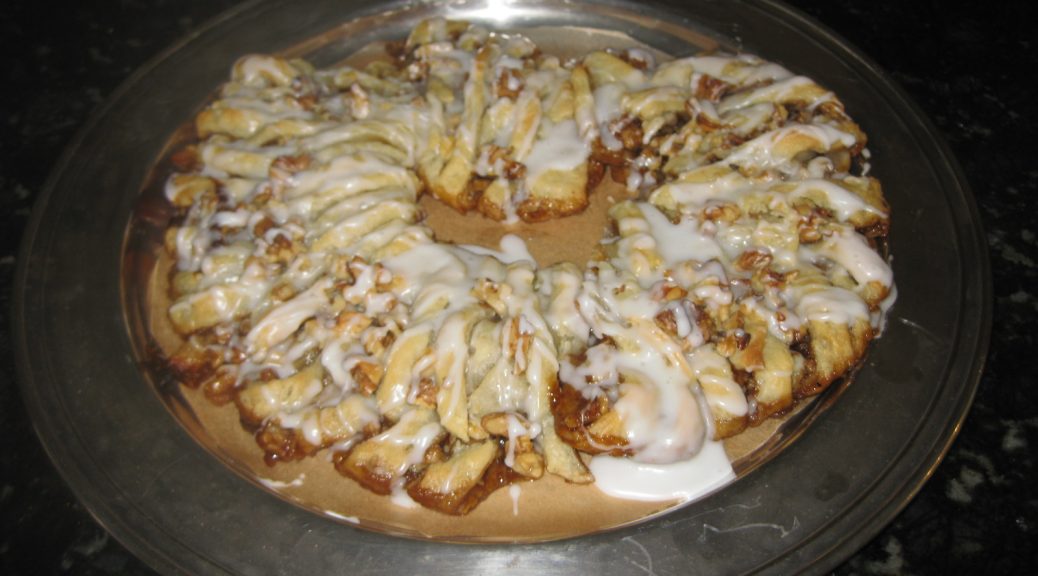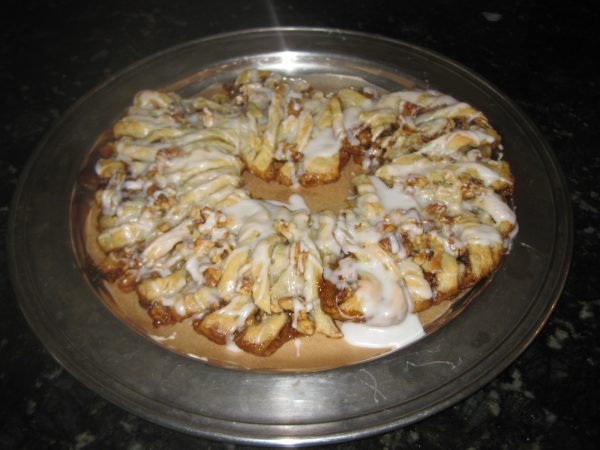Puff pastry seems to be a relative of the Middle Eastern phyllo dough. References to puff pastry appear before the 17th century indicating a history that originated through Muslim Spain and was converted from thin sheets of dough spread with olive oil to laminated dough with layers of butter, perhaps in Italy or Germany. Traditionally, however, credit is given to the French painter and cook Claude Gelée, who lived in the 17th century, for the discovery. The story goes that Gelée was making a type of very buttery bread for his sick father, and the process of rolling the butter into the bread dough created a croissant-like finished product.
Print Recipe
Italian sausage and onions in puff pastry
Italian sausage in puff pastry is a fun way to have all the flavors you enjoy in an italian sausage hoagie wrapped up in a little mini-package.
Instructions
Preheat oven to 375 degrees. While puff pastry dough is thawing, saute onions in oil and cook sausage links thoroughly. Cut the sausage links into 1/2 inch slices and set aside.
Roll out Puff Pastry on a lightly floured surface, into a 15'x15" piece. Cut pastry in 3" squares.
Place a tablespoon of carmelized onions and one slice of sausage in the center of each square. Brush edges with water.
Bring edges together to form a pouch, pinching the edges to seal. Brush with butter. Sprinkle with sea salt. Bake for 20 minutes until golden. Remove from oven. Serve with marinara sauce for dipping.
Recipe Notes
Recipe Notes Any type of sausage can be substituted for the Italian sausage and sautéed green peppers can be added for the authentic Italian sausage sub flavor. © Galley Chef All Rights Reserved

Don’t let the word “Kringle” full you into thinking that this is going to be a difficult recipe to prepare. It is easier then making donuts and much more delicious. This recipe is chock full of walnuts and brown sugar but you can also use a variety of other ingredients such as cream cheese and jam or pecans and cinnamon.
Instructions
For the crust
In a large bowl, cut the butter into the flour until the butter is the size of peas. Stir in the sour cream, form into a ball. Cover with saran wrap and refrigerate 8 hours or over night.
For the filling
Combine 1 cup soft butter, brown sugar, 1/2 cup regular walnuts and 1/2 cup of black walnuts
To prepare
Preheat the oven to 375 degrees. Prepare a cookie sheet by lining it with parchment paper. Roll the dough out as thin as you can get it on the parchment paper into a long rectangle about 24 inches by 12 inches. Cut slices about 4 inches long into the sides of the rectangle at 1/2 inch intervals. Add the filling all the way down the center. Fold each 1/2 inch wide strip towards the center, crisscrossing the filling in a braid-like fashion. Sprinkle with the remaining walnuts. Twist the entire Kringle into a circular shape. Place onto the cookie sheet and bake for 30 minutes. It will come out all gooey and bubbly with sugar running out of it everywhere and you will think you have a disaster on your hands, but it's not, to be sure. Transfer onto a clean plate and let cool for 30 minutes
For the frosting
While the Kringle is cooling, mix together the confectioner's sugar and water and drizzle over the top of the warm danish.
Recipe Notes
© Galley Chef All Rights Reserved
The rich umami flavor of roasted lamb and mint with creamy, tangy feta cheese and the crunch of pine nuts. Delicious!
Most people don’t realize that lamb is a young sheep under 12 months of age which does not have any permanent incisor teeth in wear. Mutton is meat from a sheep over two years old, and has less tender flesh. In general, the darker the colour, the older the animal. Baby lamb meat will be pale pink, in contrast to older meat which is pinkish-red. My preference is, grass-fed from Colorado.
Print Recipe
Leg of lamb stuffed with feta cheese, pine nuts, apricots and mint
The rich umami flavor of roasted lamb and mint with creamy, tangy feta cheese and the crunch of pine nuts. Delicious!
Instructions
Preheat oven to 375 degrees F. Cut six 2-foot lengths of butcher's twine. In a small skillet sauté apricots and shallots in butter 1 minute or until lightly browned. Transfer to a small bowl and mix well with feta cheese, pine nuts and mint; season to taste with salt and pepper.
To butterfly the lamb. Arrange the lamb on work surface, inside facing up. Cut through to the bone. Then around the bone on each side to open it up.
Place a sheet of plastic wrap over lamb and pound with a meat mallet to flatten meat slightly, if needed, until leg is a fairly even thickness. Remove plastic wrap and generously season inside and outside of lamb with salt and pepper.
Mound stuffing mixture lengthwise along one side of lamb; roll up lamb over stuffing, tucking in ends.
Space 5 pieces of twine under lamb roll and tie them firmly, starting at outside and working in. Tie roll lengthwise with remaining piece of twine. In a roasting pan set over 2 burners, heat oil over high heat. Add lamb roll and sear all over, about 6 minutes in all. Transfer lamb to a rack and set down in the roasting pan. Roast until brown and tender and an instant read thermometer reads 140 degrees F for medium rare, about 1 hour to 1 hour and 15 minutes, basting occasionally. Remove from oven and let sit, covered loosely with foil, 10 minutes. To serve, discard strings, slice in 12 pieces and serve
Recipe Notes
© Galley Chef All Rights Reserved
Alton Brown suggests that a dip is defined based on its ability to “maintain contact with its transport mechanism over three feet of white carpet”.
Creamy with chunks of lobster and a kick of cayenne, this seafood dip is great with a variety of crackers or bread. Use crab or lobster in this dip, or use a combination.
Instructions
Put milk, butter, cream cheese, lemon zest, lemon juice, onion, salt, paprika, and cayenne in a bowl. Blend until smooth; Use a rubber spatula to fold in the seafood. Chill until ready to use. Let sit at room temp for ½ hour before using.
Recipe Notes
Recipe Notes Crab can be substituted for the lobster or you can use a combinatioin of the two. © Galley Chef All Rights Reserved
Mahi mahi with orange, wine, garlic and thyme is a delicious and healthy meal that is as good looking as it is tasting.
Print Recipe
Mahi Mahi with orange, wine, garlic and thyme
Mahi mahi with orange, wine, garlic and thyme is a delicious and healthy meal that is as good looking as it is tasting.
Instructions
Preheat oven to 300 degrees. Season the fish on both sides with salt and pepper. Heat a non-stick skillet over medium heat. Add butter and sauté fish for 5 minutes on both sides or until golden brown. Place the fish in a single layer on a parchment paper-lined baking sheet and keep warm in oven. (The general rule of thumb for cooking fish in a 400 degree oven is 10 minutes for each inch of thickness.)
Meanwhile, deglaze the bottom of the pan with wine stirring to scrape up the bits of fond on the bottom. Increase the heat to medium high and add the garlic and thyme. Cook until reduced by about half. Stir in orange juice, and zest; Add the butter and stir until melted. Remove from heat immediately. Season with salt and pepper. Drizzle the fish with the orange sauce.
Recipe Notes
This dish goes great with roasted fennel and saffron rice. You can also substitute chicken breasts for the fish. See "saffron rice" recipe on this website. © Galley Chef All Rights Reserved
Many restaurants throughout France and Belgium offer mussels marinière. It is the classic combination of mussels with onion, garlic and white wine and a fabulous broth for dipping crusty bread into.
Print Recipe
Mussels Marinière (sailor-style)
This classic french preparation for mussels couldn't be easier. This classic combination of mussels with shallots, garlic and white wine has a fabulous broth for dipping crusty bread into.
Instructions
Combine all ingredients in a large pot, cover, place on high heat and bring to a boil. Cook for 10 minutes. Twice while they are cooking, shake the kettle in an up and down motion to toss the mussels so they all open. Serve in bowls with the broth and some crusty bread for sopping.
Recipe Notes
Recipe Notes The Pernod is the secret ingredient folks, so don't leave it out! For mussels with cream sauce: 2 T butter 2 T flour 1 cup heavy cream Melt butter in a small sauce pan. Add flour, add broth from cooked mussels and add the cream. Spoon over mussels. © Galley Chef All Rights Reserved
Pappardella are large, very broad, flat pasta noodles, similar to wide fettuccine. The name derives from the verb “pappare”, to gobble up. Pappardelle is a well-loved type of pasta in Tuscany. Tagliatelle, tagliolini, pappardelle, tortellini, and lasagne are some of the pastas made from sfoglia, the “leaves” of egg-and-flour dough. Tagliatelle which simply means cut pasta is a pasta wider than fettuccine but narrower than pappardelle. Legend has it that the tagliatelle shape–strips of pasta about a half inch wide, was invented in 1487 by Maestro Zafirano, a cook from the village of Bentivoglio, on the occasion of the marriage of Lucrezia Borgia to the Duke of Ferrara. The cook was said to be inspired by the beautiful blond hair of the bride. Despite the appeal of this romantic notion, it seems likely
that the invention of tagliatelle in Italy is earlier. Not only do we have pictorial representations of tagliatelle before this date in the Tacuinum Sanitatis, an eleventh-century Arab health manual translated into Italian that was first illustrated in the fourteenth century, but in the Compendium de naturis et proprietatibus alimentorum, a list of local Emilian nomenclature for foods compiled in 1338 by Barnaba de Ritinis da Reggio di Modena, the entry for something called fermentini indicates that it is cut into strips like tagliatelle and boiled.
Print Recipe
Papardelle with Leeks and Bacon From: GalleyChef.org
Creamy, pasta with smoky bacon. This is the best pasta I've ever had!
Instructions
Heat oil and butter in a large heavy pot over medium heat. Add bacon and cook, stirring often, until fat is rendered and bacon is crisp, 5-8 minutes. Add leeks and season with salt. Increase heat to medium-high and cook, stirring often, until leeks begin to brown, 5-8 minutes. Add cream, tarragon, pernod and 1/2 cup water. Bring to a boil, reduce heat, and simmer, stirring occasionally, until sauce is thickened and coats the back of a spoon, 5-8 minutes.
Meanwhile, cook pasta in a large pot of boiling salted water, stirring occasionally, until al dente. Drain pasta, reserving 2 cups pasta cooking liquid. Add pasta, Parmesan, and 1 cup pasta cooking liquid to sauce and stir to coat. Increase heat to medium and continue stirring,adding more cooking liquid as needed, until sauce coats pasta.
Recipe Notes
© Galley Chef All Rights Reserved

